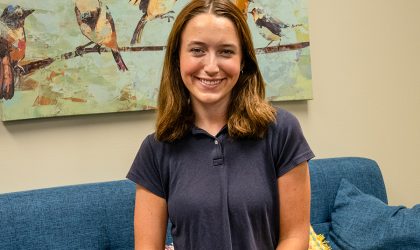

As Henry Wadsworth Longfellow so eloquently wrote in his poem “A Psalm of Life,” human beings can lead lives of greatness that will “leave footprints on the sands of time.” Longfellow was calling his readers to live life to the fullest and set an everlasting and inspiring example for others. Longfellow’s call is evident in the actions of Jackson Academy teachers, particularly those in the Academic Resource Center (ARC) who help students live more fully by understanding how they learn best, managing learning differences, developing confidence, and sharpening time management skills.
Caroline Walker Reed ’13 of Jackson praises ARC for teaching her how to cope with dyslexia and build her confidence. “They really helped me figure out how I learn best,” she said. “I study best when I can talk out loud, almost like teaching a class.”
Resource learning facilitators at JA work with students who struggle in the academic realm. These students have a diagnosed learning difference or challenges to overcome, such as test anxiety or organizational problems. Some students struggle with specific courses due to underdeveloped study skills or time management skills.
Reed earned a bachelor’s degree in business administration with a real estate emphasis from the University of Mississippi in 2017 and now works as a development manager for Heritage Properties. Reed says she used the skills she learned at JA to succeed at Ole Miss.
For students with dyslexia, certain subjects may be much more difficult than others. For instance, Reed said, “I excelled in math and science, but English and history were difficult.” She also remembers a feeling many students with learning differences understand: “When you have a learning difference, your confidence can suffer. You’re scared to ask questions. If the teacher calls on you, you’re scared to answer.”
Reed remembers how JA teachers believed in her and worked with her resource learning facilitators to help her excel. “All the teachers do a great job of building up your confidence. They let you know you’re smart and you’ve got this,” Reed said.
Like Reed, Latham Nance ’19 found the consistent relationships developed with teachers invaluable. “When you are at a school like JA where classes are academically strenuous, having the relationships with ARC teachers like Mrs. Carlson or Mr. White who were my supporters year after year is something I cannot put into words very well. ARC teachers stay with students year after year, they know our strengths and our weaknesses, and they use that knowledge to help us become the best we can be,” he said. “That consistency was something I liked best.”
“I have known I learn differently since first grade because my mom thought openly talking about it was better than the difficulty in school coming from some unknown and me thinking I was dumb,” said Nance. “My ARC teachers did the same thing. They knew my strengths and weaknesses and would help me to recognize and overcome weaknesses.”
Resource learning facilitators at JA consider dyslexia and other learning differences as different ways of learning, not as disabilities. Facilitators work alongside the students, their families, and the classroom teachers to identify individual areas that need attention and develop strategies to address those areas.
ARC offers several tiers of support to qualifying students beginning with preschool students and moving through all divisions. It addresses the underpinnings of reading and the foundation for mathematics for JA’s youngest learners. The program also provides speech and language therapy for students who need it.
“Many think that straight A’s are the only path to success, but I think differently,” Nance said. “I did my eleventh-grade research paper on dyslexic entrepreneurs, and I learned that the things that make school hard for people with dyslexia produce important qualities in individuals that are key to being successful business owners. I learned from ARC teachers how to push through difficult times, communicate what I needed, have empathy with others, and persevere when things are hard. I learned how to ask for help, which is something many adults do not do.”
“JA is committed to supporting each student’s academic journey, and the program offered by the Academic Resource Center is a part of that commitment,” said JA’s Director of Learning Diversity Beth Murray. In addition to being a certified dyslexia specialist, Murray earned a bachelor’s degree in education from the University of Mississippi and a master’s degree in administration and supervision from Mississippi College.
“One of the program’s main goals is to promote student self-confidence and independent learning,” Murray said. Teachers encourage students to take ownership of their academic lives by teaching the skills they need to be better students, which then translates into lifelong success.
“I look back at my years in ARC, and I am thankful for many things, but one of the things helping me now is time management. From seventh grade on, teachers guided us to keep up with our daily/weekly assignments in age-appropriate ways, and the teachers kept us accountable. Now, I know they were trying to help us keep the “big picture” in mind as we kept our weekly assignments and extracurricular activities in balance. In college, I am thankful for that skill. I also gained confidence from working so closely with the ARC teachers that I would not have had it if it were not for them,” said Nance.
This story is featured in the winter issue of True Blue, Jackson Academy’s alumni magazine, and was written by Ann Boswell Carlson in collaboration with the Office of Marketing and Communication.


